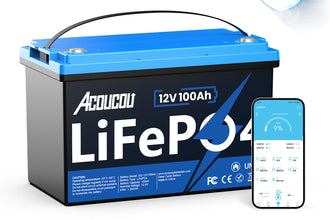

Battery terminal corrosion is a common problem that can prevent your device from starting or functioning properly. It is usually found in lead-acid batteries, and lithium iron phosphate batteries usually do not have corrosion problems.
What Is Battery Terminal Corrosion?
It refers to the build-up of a white or bluish-gray substance on the terminals and connectors of a battery. It is mainly caused by a chemical reaction between sulfuric acid and metal components in the battery. Exposure to moisture, dirt, and other pollutants also will cause corrosion. As corrosion intensifies, it can hinder current flow, leading to poor performance and potential electrical problems.
What Causes Battery Corrosion?
- Acid leakage: The corrosion of battery terminals is mainly caused by the chemical reaction between sulfuric acid in the battery and metal components. When the battery discharges and produces hydrogen gas, the gas reacts with the lead in the battery terminals to form lead sulfate. Then, lead sulfate will combine with moisture and other pollutants in the air to form a white fluffy corrosion deposit.

- Exposure to moisture: When moisture comes into contact with the metal terminals of a battery, it can cause a chemical reaction that leads to corrosion.
- Overcharging: It will produce more hydrogen gas.
- Aging: As the battery ages, corrosion is more likely to occur due to the wear and tear of internal components.
- High temperature: High temperatures will accelerate chemical reactions.
- Poor quality terminals: Low-quality or improperly installed terminals may be more prone to corrosion.
- Type of battery: Although batteries will corrode, different types of batteries will corrode to different degrees. Compared with lead-acid batteries, LiFePO4 batteries are less prone to sulfation and do not produce hydrogen gas during charging.
How To Clean Corrosion?
- Protect yourself: Wear safety glasses, a face mask, and gloves while you’re mucking around with battery corrosion, which is highly caustic.
- Disconnect the battery: Begin by disconnecting the battery, starting with the negative terminal. Carefully release the cable from the battery while being mindful to position it away from the terminal. Then, remove the positive terminal connection. It is advisable to use a battery memory saver before disconnecting the battery in order to preserve stored data and protect your vehicle's electrical system. Refer to your vehicle’s owner’s manual for specific information on using a battery memory saver.
- Inspect the battery cables: Check if the cables are damaged and replace them in time.
- Take out the battery.
- Neutralize the battery acid: Clean most of the corrosive things on the battery with a wire brush or scraper. Then, sprinkle some baking soda or battery terminal cleaner over the corrosion to neutralize the battery acid.
- Clean: Wipe off any excess solution from the terminals with a rag or paper towel.
- Reconnect the battery: Connect the red positive terminal first.
How To Avoid It?
- Keep dry environment: Try to avoid exposing the battery to a humid environment for a long time, you can choose to use a well-sealed battery storage box or environment to keep the battery dry.
- Avoid exposure to chemicals: Prevent the battery terminals from coming into contact with acidic substances or salt water, especially in outdoor activities or work, extra care is needed.
- Regular inspection and cleaning: Regularly check the condition of the battery terminals, such as the tightness of the battery terminal connections, and clean the battery terminals as soon as you find signs of corrosion to prevent the corrosion from intensifying.
- Apply a protective coating: Apply protective coating on the terminals.
- Avoid overcharging: Follow the manufacturer's recommendations for charging and avoid producing much hydrogen gas.
- Prevent acid leakage: As for lead-acid batteries, ensure that the battery ventilation cover is properly sealed
- Choose high-quality batteries:Choose lithium iron phosphate batteries with guaranteed quality, which can reduce the risk of battery terminal corrosion.
Change To LiFePO4 Batteries To Minimize Corrosion Damage
Lithium iron phosphate has stable chemical properties and usually does not have corrosion issues.
- Stable chemical properties: LiFePO4 batteries are less prone to sulfation and do not produce hydrogen gas during charging.
- Longer lifespan: Acoucou LiFePO4 batteries have 6000-12000 deep cycles and can be used for 10 years at recommended conditions because of the high-quality cells.

- Safer: Acoucou uses smart BMS with 6 protections to prevent the batteries from overcharging, high temperature, etc.

- Maintenance-free: Unlike lead-acid batteries, LiFePO4 batteries do not require regular water replenishment.
- Protective cover: Acoucou LiFePO4 batteries are equipped with protective covers to reduce some damages.

Overall, with proactive care and attention, the terminals of batteries can remain in good condition, ensuring optimal performance and longevity. Compared with other batteries, Acoucou LiFePO4 batteries are safer and have longer lifespan.










